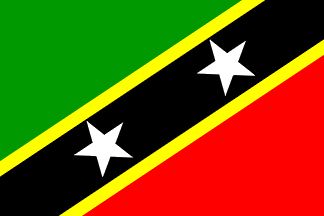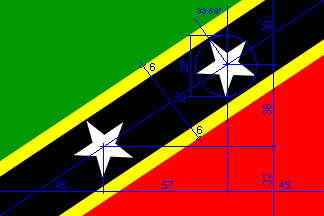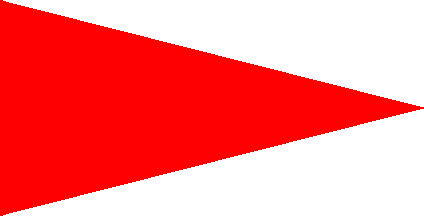 image by Zoltan Horvath, 10 September 2024
image by Zoltan Horvath, 10 September 2024
Last modified: 2024-10-05 by rob raeside
Keywords: saint kitts and nevis | saint christopher and nevis | nevis | anguilla | kitts | saint kitts | star: 5 points (white) | stars: 2 | country above self | governor general |
Links: FOTW homepage |
search |
disclaimer and copyright |
write us |
mirrors
 image by Zoltan Horvath, 10 September 2024
image by Zoltan Horvath, 10 September 2024
The Album 2000 [pay00] says:
1. National Flag.Green-red flag divided by a rising black diagonal bend fimbriated with yellow bearing two white five-pointed stars. Judging from the image in the Album and using 1/20 of hoist as unit, the width of the bend is 5 and fimbriations 1 unit each. The stars are inscribed in circle of 4 in diameter. Distance of the centers of the circles is 16 units.2:3
Flag adopted 19 September
1983, coat of
arms adopted 16 February 1967 (motto changed 19 September 1983).
Nozomi Kariyasu
It is commonly stated that the two stars symbolize the two
islands, but in fact they stand for hope and liberty (source:
[cra90] and
[poe90]) In addition, Eve
Devereux’s Identifying flags
[dev94]
gives further that green is for fertility,
red for the liberation struggle, black for the African heritage
and yellow for sunshine. The white stars express hope and
freedom.
António Martins, 20 May 1998
The national flag of St. Kitts & Nevis features green for our
fertile lands, yellow for our year-round sun-shine, black for
our African heritage, and red for our struggle from slavery
through colonialism to independence. It also displays two white
stars on a black diagonal bar, symbols of hope and liberty.
Dov Gutterman, 24 June 1999, quoting
stkittsnevis.net
November 1985 flag of St-Kitts-Nevis was changed according
Flagmaster 49 [flm]
and Vexillinfo 70 [vxf].
The stars are push pointed up. I assume that, if the info is exact,
same pattern was reproduced in the ensigns and Nevis flag. Seems
that the change, if exist, was shord lived and some days or weeks
after, the stars recover their initial position.
Jaume Ollé, 22 January 2000
I was checking what I had on the flag of St Kitts and Nevis, and the answer
is 'not a lot'. All I have is a single black/white page stamped by the Prime
Minister's Office, Home Affairs Division, and undated.
In the first place, it confirms that the official symbolism is exactly that
given by Dov Gutterman. The flag's designer was Miss Edrice Lewis, it was the
"winning entry ... chosen from 258 submitted designs" in competition which
"closed on 28th February 1983", and "after approval by Cabinet" was sent to the
College of Arms in London.
The illustration carries hand-written notes by William Crampton (subsequently
checked by myself), and shows a diagonal stripe, fimbriation and stars detailed
slightly differently than those shown by ourselves:
On a flag of 100 x 150 units, the diagonal stripe is 30 units wide with a
fimbriation of 6 units. The stars with one point towards the base (or if you
prefer, the two outer points parallel to the stripe) are contained within
circles of 28 units,while the centre-point of the first (circle) is situated 48
units from the hoist, and the second 45 units from the fly - or 48-57-45.
Christopher Southworth, 11 February 2005
"The Sun of Saint Kitts and Nevis", 24 July 2008, names the designer of the
national flag as Edrice Lewis-Viechweg, now residing in Connecticut, USA. She
taught at the Irish Town Primary School, Basseterre, in 1987, immediately after
she left high school, and keeps supporting the school by donating scholastic
items to valued students.
Source:
http://sunstkitts.com/paper/?asknw=view&asknw=view,view&sun=494418078207132005&an=414034088907242008&ac=Local
The "IslandFlave" website adds that Edrice Lewis, then a student, won the
national contest for the flag design, among 258 entries. She is said to have
given the official interpretation of the flag.
Source:
http://www.islandflave.com/caribbean-flags/st-kitts-nevis-flag.php [We
welcome another talented female vexillologist and another successful flag
contest!]
Ivan Sache, 29 July 2008
There is no official source that gives exact colors of the national flag; all
sources below provide approximate colors from their documented sources.
Zoltan Horvath, 10 September 2024
The protocol manual for the
London 2012 Olympics
(Flags and Anthems Manual
London 2012 [loc12]) provides recommendations
for national flag designs. Each
NOC
was sent an image of the flag, including the
PMS shades, for their approval by LOCOG. Once this was obtained, LOCOG produced
a 60 x 90 cm version of the flag for further approval. So, while these specs may
not be the official, government, version of each flag, they are certainly what
the NOC
believed the flag to be.
For St Kitts & Nevis: PMS 355 green, 109 yellow, 032 red and black. The vertical
flag is simply the horizontal version turned 90 degrees clockwise.
Ian Sumner, 10 October 2012
The Flag Manual - Beijing 2008 gives Pantone colors: PMS 032 (red), PMS 116
(yellow), PMS 347 (green) and PMS Black.
The Album des Pavillons 2000 [pay00]
(Corr. No. 4.) gives approximate colors in Pantone and CMYK systems:
Red:
Pantone 186c, CMYK 0-90-80-5
Green: Pantone 355c, CMYK 100-0-90-5
Yellow:
Pantone 116c, CMYK 0-10-95-0
Blue: Pantone 300c, CMYK 100-45-0-0
Flags
and Anthems Manual London 2012 [loc12] gives
Pantone colors: PMS 355 (green), PMS 109 (yellow), PMS 032 (red), and PMS Black.
The Album des Pavillons 2023 specifies the colors of the flags in three
color systems:
Blue: Pantone 300c, CMYK 88-57-0-0, RGB 0-103-198
Red:
Pantone 186c, CMYK 10-100-74-2, RGB 210-16-52
Yellow: Pantone 116c, CMYK
0-19-93-0, RGB 255-206-0
Green: Pantone 355c, CMYK 84-12-100-1, RGB 0-149-48
Vexilla Mundi gives colors in Pantone
system: PMS 3256C (green), PMS 186C (red), PMS Black, PMS 116C (yellow), and PMS
White.
Wikipedia illustrates the
flag, and construction details, and gives rendered RGB color values based on
Pantone colors published by the Album des Pavillons 2000 [pay00]:
Red:
RGB 200-16-46, Pantone 186c
Green: RGB 0-151-57, Pantone 355c
Yellow: RGB 255-209-0,
Pantone 116c
Black: RGB 0-0-0
White: RGB 255-255-255
Flag Color Codes
gives the following color values:
HexRGBCMYKPantoneRAL
Green: Hex #009739,
RGB 0-151-57, CMYK
93-0-100-0, Pantone 355, RAL 6037
Yellow: Hex #FFD100, RGB 255-209-0, CMYK 0-5-100-0,
Pantone 109, RAL 2007
Black: Hex #000000, RGB 0-0-0, CMYK 0-0-0-100, Pantone Black,
RAL 9005
White: Hex #FFFFFF, RGB 255-255-255, CMYK 0-0-0-0, Pantone N/A, RAL N/A
Red:
Hex # EF3340, RGB 239-51-64, CMYK 0-90-76-0, Pantone 032, RAL 3024
Zoltan Horvath, 10 September 2024
 image by Željko Heimer, 13 February 2005
image by Željko Heimer, 13 February 2005
The star can be pointing at once both perpendicular to the diagonal and also
toward the bottom, even though the difference in just over 2 degrees. Namely the
rotation of the diagonal from the horizontal axis is 33.69° (i.e. ctan(100/150))
while the downpointing star would have to be rotated 36°. I take that the stars
are rotated 33.69 that seems to me more appropriate.
The horizontal division of 48-57-45 provides quite nice vertical division as
well (top to bottom): 30-38-32. The diameter of 28 gives the stars somewhat
larger then we are used to see (I guess).
Željko Heimer, 13 February 2005
I think that the stars should be directed towards upper hoist (or, more
correctly, axes of the stars’ upper points should be perpendicular to the axis
of the diagonal stripe)… and some people interprets it as «stars pointing
up» while other as «pointing down». In the Czech vexillological periodical
Vexillology [vex], even the changes of
SKN flags were reported in the 1980s.
Jan Zrzavy, 08 August 2001
Carefully looking at the official illustration again, I can confirm that it
definitely shows the stars at 33.69 degrees as Željko quite rightly
surmises. William actually got this right in his handwritten annotations, but
wrong on his finished spec (which is what I, without further checking,
uncritically followed). In our mutual defence (and as I hope Željko will
agree) the difference is actually very small.and visually almost
indistinguishable?
Christopher Southworth, 13 February 2005
I am glad that this is so - it makes my "speculations" of the other ensigns
much more credible. Anyway, the difference is indeed small and hardly
noticable. A bit more noticable in the two other ensigns,
as you may see.
Željko Heimer, 13 February 2005
What exactly is the official name of this country now? I know that at one
time it consisted of two separate colonies, St Christopher and Nevis, but St
Christopher was also called St Kitts (presumably an 18th Century version of the
traditional English short form of the name Christopher, i.e., Kitt, which is the
version currently used). Then the colonies were merged and apparently the two
forms were used interchangeably as St Christopher & Nevis or St
Kitts-Nevis. Then for a time during the 1960s/70s Anguilla was attached to the
colony and it was known as St Kitts-Nevis-Anguilla, although the latter was
separated after a few years (I believe there was some sort of brouhaha on
Anguilla about this, and if I am not mistaken about twenty Metropolitan Police
personnel were sent from London to restore order). Has the official name now
reverted to St Kitts-Nevis, or is the St Christopher-Nevis form also used
interchangeably?
Ron Lahav, 13 February 2005
Article 1 of the constitution of the Federation outlines the official forms of the name:
“The Federation and its territory.
(1) The island of Saint Christopher (which is otherwise known as Saint Kitts) and the island of Nevis shall be a sovereign democratic federal state which may be styled Saint Christopher and Nevis or Saint Kitts and Nevis or the Federation of Saint Christopher and Nevis or the Federation of Saint Kitts and Nevis.”
Therefore both Christopher and Kitts are official names.
It also appears that the abbreviation St. for Saint is de-facto acceptable given it’s use by the government, presumably as using St. or Saint in reference to the name of the country does not Inherently change the full names at all.
Hemendra Bhola, 19 July 2020
red pierced black
 image by Antonio Martins, 15 Aug 1999
image by Antonio Martins, 15 Aug 1999
red pennant
 image by Antonio Martins, 15 Aug 1999
image by Antonio Martins, 15 Aug 1999
According to the WMO book [c9h07], St Kitts and Nevis partly use the well-known US signal set:
(The fourth item of the set i.e. 39a (double set of red pennants)
is not used.)
Jan Mertens, 23 March 2008